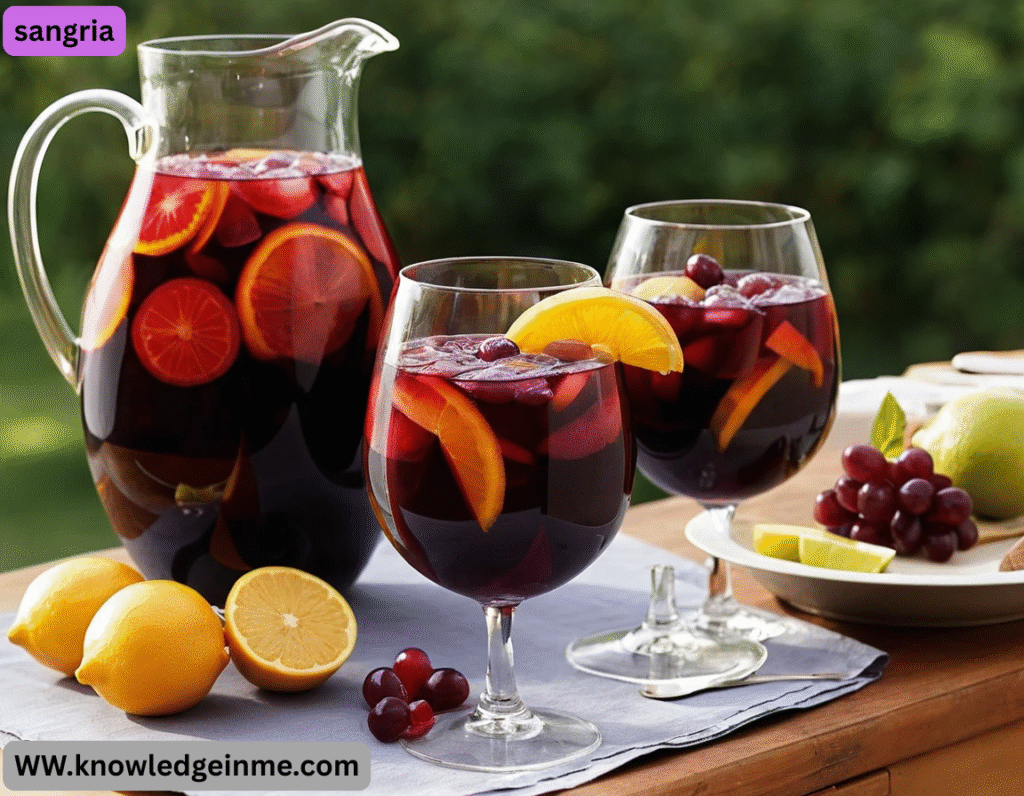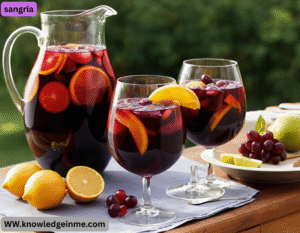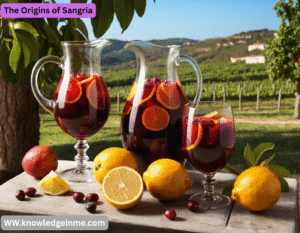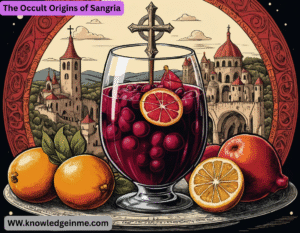sangria It typically combines red wine with chopped fruit, sweeteners, and sometimes brandy or other spirits. Here’s a classic recipe and variations:
Classic Red Sangria Recipe
Ingredients:
- 1 bottle (750ml) dry red wine (like Tempranillo, Rioja, or Cabernet Sauvignon)
- 1/4 cup brandy (or orange liqueur like Cointreau)
- 1-2 TBSP sugar or honey (adjust to taste)
- 1 orange (sliced)
- 1 lemon (sliced)
- 1 lime (sliced)
- 1 apple (chopped)
- Optional: Cinnamon stick, berries, or peaches
Instructions:
- Before serving, add club soda for fizz. Serve over ice.
Variations:
- White Sangria: Use white wine (like Sauvignon Blanc) + peaches, green apples, and mint.
- Rosé Sangria: Rosé wine + strawberries, raspberries, and a splash of elderflower liqueur.
- Sparkling Sangria: Substitute still wine with sparkling wine (add right before serving).
- Non-Alcoholic: Use grape juice + citrus + ginger ale.
The Origins of Sangria
- Roots: Sangria comes from Spain and Portugal (“sangria” means “bloodletting” in Spanish, referring to its deep red color).
- Traditional base: Early versions used red wine mixed with fruit, spices, and sometimes brandy to mask low-quality wine.
- Global popularity: Became famous internationally after the 1964 World’s Fair in New York.
Expert Tips for the Best Sangria
- Wine choice: Use a mid-range, fruity wine (avoid expensive bottles—flavor gets diluted).
- Red: Tempranillo, Garnacha, or Merlot.
- White: Albariño or Pinot Grigio.
- Fruit prep: Cut fruit into small pieces for maximum flavor infusion. Citrus (oranges/lemons) adds acidity; apples/pears add crunch.
- Sweetener hack: Use simple syrup or agave for even dissolving.
- Strength boost: Add 1/4–1/2 cup liquor (brandy, rum, or triple sec) for depth.
Creative Sangria Variations
Seasonal Twists:
- Spring: Prosecco + strawberries + basil + elderflower liqueur.
Unique Boosts:
- Spicy: Red wine + jalapeño slices + blackberries + tequila.
- Herbal: Rosé + watermelon + mint + gin.
Non-Traditional Bases:
- Cider Sangria: Hard apple cider + bourbon + autumn spices.
Serving & Presentation
- Glassware: Serve in mason jars or wine glasses with ice.
- Pairings: Tapas, grilled meats, or cheese boards.
Common Mistakes to Avoid
- Over-sweetening: Taste before adding sugar—fruit and wine add natural sweetness.
- Soggy fruit: Remove fruit after 12 hours to prevent mushiness.
- Flat sangria: Add soda (or sparkling wine) last to keep it fizzy.
Sangria’s Ancient Roots & Wild History
- Roman Origins: The concept of wine + fruit + spices dates back to 200 BC, when Romans mixed wine with sugar and spices to purify water.
- Colonial Influence: Spanish settlers brought sangria to the Americas, where it evolved with local fruits (like guava in Cuba or prickly pear in Mexico).
- Legal Drama: In 2014, the EU ruled that only sangria made in Spain/Portugal can be labeled as “Sangria” commercially—elsewhere, it’s “fruit wine punch.”
The Science of Perfect Sangria
- Smaller fruit pieces = faster infusion (but longer marinating = deeper taste).
- Fizz Physics: Adding soda last preserves bubbles—carbonation escapes faster in acidic mixtures. For extra fizz, use dry ice (safely!) for a smoky effect.
- Color Hack: Want vibrant red sangria? Add pomegranate juice or muddled blackberries. For white sangria, use peeled peaches to avoid browning.
Bizarre (But Brilliant) Sangria Hacks
- Frozen Fruit Cubes: Freeze sangria with fruit into ice cubes to avoid dilution.
- Smoked Sangria: Char orange slices with a kitchen torch before adding for a smoky depth.
- Sangria “Boba”: Use boozy fruit spherification (like molecular cocktails) for a fun texture.
- Sangria Snow Cone: Blend frozen sangria into a slushie, top with sparkling wine.
Global Sangria Spin-Offs
- Tinto de Verano (Spain): Simpler than sangria—equal parts red wine + lemon soda.
Advanced Pairings & Culinary Uses
Cheese Pairings:
- Red sangria: Manchego or blue cheese.
- White sangria: Goat cheese or brie.
Sangria-Infused Food:
- Dessert: Poach pears in sangria, reduce into syrup for ice cream.
- Savory: Use sangria as a marinade for pork or in a seafood ceviche.
Controversial Debates
- To Strain or Not? Purists say leave the fruit in; others strain for a cleaner drink.
- Ice Crime: In Spain, sangria is often served without ice (wine is chilled beforehand).
- Brandy vs. Rum: Spaniards insist on brandy, but Caribbean versions swear by rum.
DIY Sangria Bar Guide
Host a build-your-own sangria bar with:
- Wine options: Red, white, rosé, even sparkling.
- Fruit stations: Tropical (pineapple, mango), berries, or citrus.
- Liquor add-ins: Brandy, rum, St-Germain, or Aperol.
- Toppers: CBD tinctures, edible glitter, or Tajín rims.
Hangover-Free(ish) Sangria?
- Low-Sugar: Use dry wine + monk fruit sweetener + hydrating fruits (watermelon, cucumber).
- Low-ABV: Dilute with herbal iced tea or coconut water.
- Electrolyte Boost: Add a pinch of salt and splash of coconut water pre-party.
The Occult Origins of Sangria
- Dionysian Blood Rituals: Ancient Greek revelers mixed wine, fruit, and honey as an offering to Dionysus—some scholars argue sangria evolved from these pagan “blood wine” ceremonies.
- Alchemical Sangria: Medieval Spanish monks infused wine with herbs (like wormwood or mugwort) for “medicinal” hallucinogenic sangria. (Don’t try this at home.)
- Sailor’s Superstition: Catalan pirates added citrus to wine to prevent scurvy… and spiked it with gunpowder for courage. (Definitely don’t try this.)
Laboratory-Grade Sangria Hacks
- Vacuum-Infusion: Use a whipping siphon to compress fruit and wine together—infuses flavor in 10 minutes instead of hours.
- Sous-Vide Sangria: Bag wine + fruit + spices, cook at 135°F (57°C) for 2 hours for max extraction without bitterness.
- Liquid Nitrogen: Flash-freeze sangria into a smoking slushie for a science-fair-meets-cocktail-party vibe.
Lost Sangria Variants Resurrected
- Moorish Spiced Sangria: Red wine + dates + rosewater + black pepper (popular in medieval Al-Andalus).
- Prohibition “Bathtub” Sangria: Bootleggers mixed cheap grape juice + grain alcohol + canned peaches (it was as bad as it sounds).
Sangria as Art
- Edible Paint: Reduce sangria into a syrup, mix with edible pigment, and “paint” designs on serving glasses.
- Performance Art: Serve in a hollowed-out watermelon skull with dry ice “smoke” pouring from the eyes. (Instagram gold.)
Sangria Warfare: Historical Booze Battles
- The Sangria vs. Tinto de Verano Feud: Spaniards still fight over which is superior. (Sangria is touristy; tinto is “local.”)
- The Great Sangria Riot of 1968: A Barcelona bar ran out of sangria at a festival… chaos ensued.
- The “Fake Sangria” Scandals: In the 1980s, some European bars used boxed wine + food coloring—leading to stricter labeling laws.
The Wizardry of Fermented Fruit
- Second-Life Sangria: Save used sangria fruit, ferment it into fruit vinegar for cooking.
- Sangria Kombucha: Mix leftover sangria with a SCOBY to create a funky, fizzy probiotic drink.
- Sangria Leather: Purée fruit leftovers, dehydrate into boozy fruit leather snacks.






